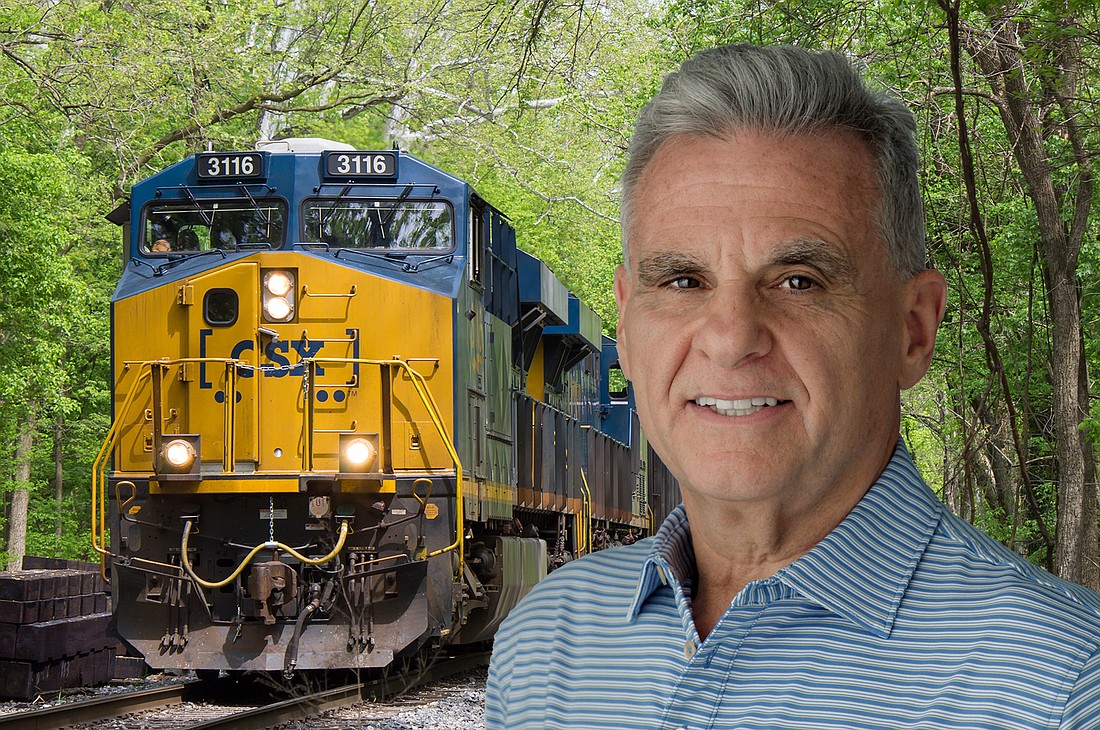
CSX Corp. offered no surprises in its Oct. 19 third-quarter earnings report and conference call with analysts.
“In the bigger picture, 3Q was a relative non-event and bulls looking for signs of a growth story need to wait for the cycle inflection to come,” Morgan Stanley analyst Ravi Shanker said in a research note.
“Perhaps more than the numbers, the focus on the call was the debut of new (though very well known to the street) COO Mike Cory following the sudden surprise departure of CSX’s old COO during the quarter,” he said.
Cory joined CSX as executive vice president and chief operating officer Sept. 25. He replaced Jamie Boychuk, who left the Jacksonville-based railroad company in August.
Cory spent nearly 40 years at Canadian National Railway before retiring as chief operating officer in 2019.
“Mike has a very strong reputation in the rail industry,” CEO Joe Hinrichs said in an interview after the earnings report.
“Mike has a very collaborative approach to leadership and working together,” he said.
The quarterly conference call gave analysts their first chance to question Cory on what he might do at CSX, but Cory reminded them he’s new to the job and is still trying to get to know the company and its employees.
“That said, I see opportunities, one of which and to me the most important at this stage is to create and share a robust and visible flow of information that will drive improvement through the continuation of the lead principles that define scheduled railroading,” Cory said in the call.
“We all need to see the effects of our collective decisions as fast as possible to be more nimble and responsive to our customer’s needs,” he said.
CSX implemented a new operating model called precision scheduled railroading, or PSR, under then-CEO Hunter Harrison in 2017.
Harrison was a former CEO of Canadian National, so Cory worked with him.
Evercore ISI analyst Jonathan Chappell pointed out in the conference call that Cory went through a transition from improving operations with PSR to a focus on growth at Canadian National. That transition was apparently bumpy.
“CSX is now several years into its focus on efficiency and productivity gains, but recent turnover in the management ranks points to a pivot to volume/revenue growth,” Chappell said in a research note after the call.
“However, CSX’s current resource base, labor and equipment provides material slack capacity to add better-than-GDP volume growth consistently for the foreseeable future, with operations now led by a COO that has witnessed the power of productivity … and the potential pitfalls of too much growth for a network to handle efficiently,” he said.
J.P. Morgan analyst Brian Ossenbeck said in his note that CSX was operating at “best-in-class service levels” before Cory’s arrival.
“Cory’s expertise was not needed to fix any operational issues,” Ossenbeck said.
“Instead he is focused on driving further collaboration between sales and ops throughout the organization which should help CSX leverage service improvements into potential growth opportunities. He is also focused on improving all levels of the operations and CSX recently started a mentoring program for new hires in the field,” he said.

Cory is expected to work closely with Kevin Boone, who moved from executive vice president of sales and marketing to executive vice president and chief commercial officer when Cory was hired.
Susquehanna Financial analyst Bascome Majors said in his note that Boone expressed optimism about CSX’s growth opportunities in the conference call.
“While eyes remain on a potentially looming recession and that the current market is generally challenging for the rails, Boone suggested CSX has already managed through these macro headwinds in many of their core markets ‘for the past three, four quarters’ and that they only really have upwards to go as comps get easier into 2024,” Majors said.
“In short, CSX continues to cast their 2024 volume opportunity with more enthusiasm than other U.S. rails,” he said.
Johnson & Johnson reported higher third-quarter sales at its Jacksonville-based vision products subsidiary, but said U.S. sales of contact lenses made in Jacksonville fell.
Total vision sales rose 5.4%, after foreign currency adjustments, to $1.26 billion and contact lens sales rose 4% to $928 million because of strong international sales.
However, U.S. contact lens sales fell 1.2% to $399 million.
Jessica Moore, vice president of investor relations, said in Johnson & Johnson’s Oct. 17 conference call that price actions and new products helped contact lens sales in the quarter.
“Growth of contact lenses was partially offset by strategic portfolio choices and supply challenges, although these continue to improve,” she said, according to a company transcript of the call.
Moore also said total growth in vision products was lowered by the company’s sale of its Blink eye and contract lens drops business.
Johnson & Johnson did not previously announce the deal but Bausch + Lomb Corp. announced in July it bought Blink for $106.5 million.
Johnson & Johnson acquired Blink as part of its $4.325 billion acquisition of California-based Abbott Medical Optics in 2017, which expanded the vision business beyond contact lenses into other eye care products.
Much of Wall Street’s focus on Fidelity National Information Services Inc., known as FIS, has been on its disappointing 2019 acquisition of payment processing company Worldpay Inc.
But one analyst thinks investors are overlooking another FIS deal: the 2015 acquisition of SunGard Data Services Inc.
“We believe that investors never gained a very granular view of the SunGard business after it was acquired by FIS in 2015 and before a deeper understanding could develop, focus shifted to Worldpay,” Barclays analyst Ramsey El-Assal said in an Oct. 19 research report as he raised his rating on FIS from “equal weight” to “overweight.”
Jacksonville-based FIS is known mainly for providing technology for banks but the acquisition of SunGard bolstered the company’s capital markets technology business, El-Assal said.
Wayne, Pennsylvania-based SunGard had a large operation in Jacksonville after acquiring a Jacksonville-based computer services firm called Corbel & Co. in 1996.
SunGard employed more than 1,000 people in Jacksonville when it was acquired by FIS.
FIS agreed in July to sell a majority interest in Worldpay, which has produced disappointing results since the acquisition. That leaves the company with its banking and capital markets businesses.
“Following the sale of Worldpay, the Capital Markets Solutions segment has become an increasingly critical growth driver for FIS; however, in our view, investors lack clarity around what precisely flows into and drives this complex segment,” El-Assal said.
“We believe the Capital Markets segment will grow faster than the core Banking segment over the long term,” he said.
Two days before El-Assal’s report, Wolfe Research analyst Darrin Peller upgraded FIS from “peer perform” to “outperform.”
“We are encouraged by solid results in RemainCo (the banking and capital markets businesses) to-date and have become increasingly constructive on FIS moving forward post WP transaction close,” Peller said in his research note.
“We expect a new narrative will form emphasizing an attractive recurring revenue growth story in addition to the removal of any discussion surrounding share-loss or legacy acquiring,” he said.
Peller set a $65 price target for the stock, which was trading at $52.60 at the time of his report.
El-Assal raised his price target for FIS from $62 to $69.
Deutsche Bank analyst Lauren Silberman initiated coverage of Restaurant Brands International Inc. with a “buy” rating, citing the hiring a year ago of former Dominos Pizza CEO Patrick Doyle as executive chairman as a key factor.
“We believe Chairman Patrick Doyle provides a halo for RBI as investors effectively invest alongside the well-regarded restaurant executive (personally invested $30 million with about a 5-year duration) who is meaningfully involved in the overall strategy,” Silberman said in her Oct. 18 report.
Toronto-based RBI acquired Jacksonville-based Firehouse Restaurant Group Inc. almost two years ago, but Firehouse Subs is only a small part of the company, which also owns the Burger King, Popeyes and Tim Hortons chains.
“We expect Burger King International to remain the powerhouse of the portfolio, Burger King U.S. to stabilize, and Popeyes and Tim Hortons International to increasingly contribute to the growth algorithm,” Silberman said.
She said Firehouse represents about 4% of RBI’s total restaurants.
“Firehouse Subs has demonstrated average unit growth of about 2.5% over the last five years, though prior to 2017 it was growing at a double-digit pace,” she said.
Silberman projects Firehouse’s growth of restaurants to pick up gradually, reaching 5.3% in 2025.
“We expect the brand to leverage RBI’s existing development infrastructure and franchisees to support accelerated growth,” she said.
ComSovereign Holding Corp. said Oct. 20 it received a notice from the Nasdaq Listing Qualifications Staff that it will be delisted from Nasdaq unless it files a timely request for a hearing on the matter.
ComSovereign said it will request a hearing and present a plan to meet Nasdaq’s listing requirements.
The Tucson, Arizona-based company was created in late 2019 by the merger of Jacksonville-based Drone Aviation Holding Corp. and ComSovereign Corp.
Its Drone Aviation subsidiary continues to be headquartered in Jacksonville. Besides the tethered drone business, it also operates telecommunications subsidiaries.
ComSovereign said it faces delisting because it has not yet filed its annual report for 2022 or its financial reports for the first two quarters of 2023.